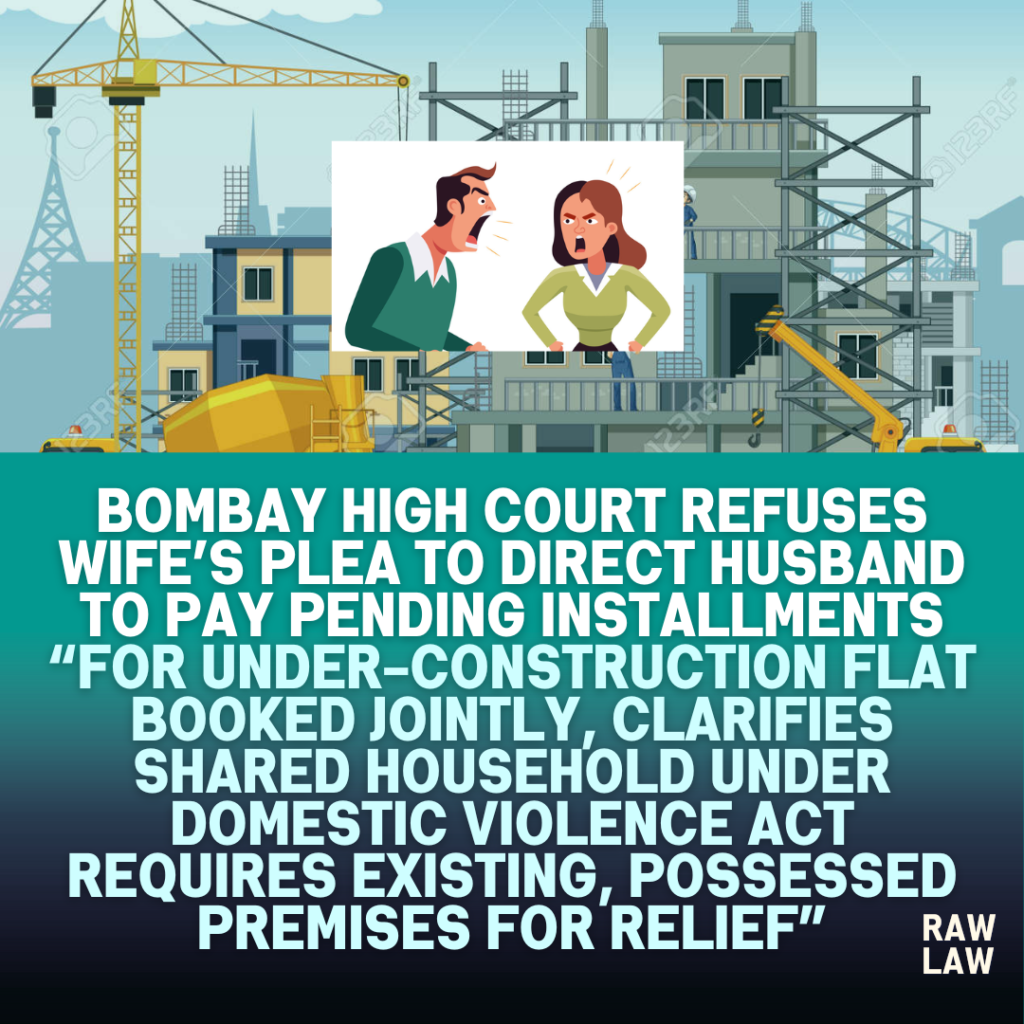Court’s Decision
The Bombay High Court dismissed the wife’s petition seeking directions to her husband to pay pending installments to the developer for an under-construction flat booked jointly, holding that such a property, not yet in possession of either party, does not qualify as a “shared household” under Section 2(s) of the Protection of Women from Domestic Violence Act, 2005. The Court affirmed the lower courts’ orders, ruling that the relief sought under Section 19(d) and (e) of the DV Act cannot be granted in such circumstances.
Facts
The petitioner married the respondent in 2013 and alleged domestic violence, including emotional and physical abuse, during their cohabitation. The husband, who worked at Amazon Luna in the USA, returned to India in 2020, and to reconcile, booked a flat jointly with the petitioner in Malad West, Mumbai, using a loan from HDFC Bank. After returning to the USA, the husband allegedly stopped paying rent and maintenance, leading to arrears. The wife filed a DV complaint and sought interim relief, including payment of pending installments for the under-construction flat, asserting it was her “shared household.” Both the Magistrate and Sessions Court rejected this relief, leading to the present writ petition.
Issues
- Whether an under-construction flat, not in possession of either party, can be treated as a “shared household” under Section 2(s) of the DV Act.
- Whether the wife can seek a direction under Section 19(d) and (e) of the DV Act for the husband to pay pending installments for such a property.
- Whether constructive residence suffices for seeking relief under the DV Act in the absence of actual residence or possession.
Petitioner’s Arguments
The petitioner argued:
- She was in a domestic relationship with the respondent, and the under-construction flat, booked jointly, qualified as a “shared household.”
- The definition of “shared household” under Section 2(s) and the Supreme Court’s judgment in Prabha Tyagi v. Kamlesh Devi should be interpreted broadly to include even constructive residence.
- As she had no alternate residence, she was entitled to relief under Section 19(d) and (e) of the DV Act.
- The flat was intended to be their marital residence, and the husband could not avoid obligations by refusing to complete the purchase.
Respondent’s Arguments
The respondent argued:
- The under-construction flat was never occupied by either party, and therefore, it did not qualify as a “shared household.”
- Section 2(s) requires that the aggrieved person must have lived or currently live in the premises, which was not the case here.
- Reliance on Prabha Tyagi was misplaced, and the actual cohabitation requirement under Manmohan Attavar v. Neelam Manmohan Attavar and Satish Chander Ahuja v. Sneha Ahuja should prevail.
- Relief under Section 19(d) and (e) is intended to prevent dispossession from existing residences, not to compel payment for under-construction properties.
Analysis of the Law
The Court analysed:
- Section 2(s) of the DV Act defines “shared household” and requires actual residence or a right to residence in a household in existence.
- Section 19(d) and (e) enable protection from dispossession and alienation but do not extend to enforcing payment obligations for incomplete, unpossessed flats.
- The judgment in Prabha Tyagi clarifies constructive residence but within the context of existing households where the wife was prevented from residing due to domestic violence.
Precedent Analysis
- Prabha Tyagi v. Kamlesh Devi (2022): Held constructive residence can suffice for claiming residence rights but within the framework of an existing household.
- Manmohan Attavar v. Neelam Manmohan Attavar (2014) and Satish Chander Ahuja v. Sneha Ahuja (2020): Emphasised the need for actual residence and a subsisting right in an existing household to invoke the DV Act.
- These cases were applied to clarify that relief under Section 19 requires the property to be in existence, with the aggrieved person having lived or having a right to live therein.
Court’s Reasoning
The Court held:
- The under-construction flat was not yet in possession of either party, and no cohabitation occurred in the premises.
- The DV Act’s provisions, though welfare-oriented, cannot be extended to compel a husband to complete a property transaction for a property that does not qualify as a shared household.
- The relief sought was beyond the scope of Section 19(d) and (e), which are designed to prevent eviction from and alienation of an existing shared household.
Conclusion
The writ petition was dismissed, and the orders of the Sessions Court and Magistrate rejecting the relief sought by the petitioner were upheld, confirming that no direction could be issued to the husband to pay pending installments for the under-construction flat under the DV Act.
Implications
- Clarifies the limits of the DV Act regarding shared household claims.
- Reinforces that under-construction, unpossessed flats do not fall under Section 2(s) for relief under Section 19.
- Prevents the misuse of domestic violence proceedings to enforce property transactions unrelated to the core protective intent of the Act.
Cases Referred and Their Reference Here
- Prabha Tyagi v. Kamlesh Devi (2022): Applied for defining constructive residence, but the Court clarified it applies only to existing residences.
- Manmohan Attavar v. Neelam Manmohan Attavar (2014): Emphasised actual residence requirements.
- Satish Chander Ahuja v. Sneha Ahuja (2020): Highlighted the necessity of cohabitation in a shared household.
- The Court utilised these judgments to define the scope of “shared household” and its limitations under the DV Act.
FAQs
1. Can an under-construction flat be claimed as a shared household under the DV Act?
No, if it is unpossessed and never occupied, it does not qualify as a shared household under Section 2(s).
2. Can a wife seek direction for payment of installments under the DV Act for such a flat?
No, Section 19 does not empower courts to enforce payment obligations for unpossessed properties.
3. Does constructive residence apply to under-construction properties?
No, constructive residence applies only to existing premises where a wife is prevented from residing due to domestic violence.
